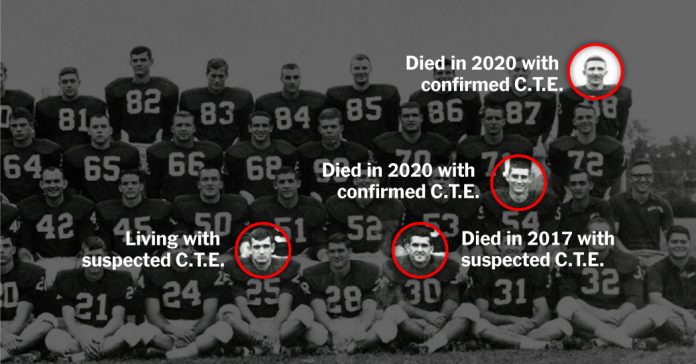The repercussions of C.T.E., which can’t be definitively identified till after an individual’s dying however is routinely present in soccer gamers when researchers are allowed to conduct autopsy examinations, will be jarringly conspicuous: episodes of confusion and reminiscence loss, spasms of anger and argument and steep declines in communication and decision-making expertise.
“You simply see them actually flip into somebody completely completely different,” mentioned Heike Crane, the widow of Paul Crane, who performed heart and linebacker for Alabama and in the end developed C.T.E. earlier than his dying in 2020.
About 60 years in the past, although, lengthy earlier than C.T.E. was a acknowledged danger, soccer at a spot like Alabama was a waypoint to wealth, stature and envy. Even now, amid their agony, gamers and their households are sometimes reluctant to want soccer away from campuses or American tradition. Change the game, some say, however hold enjoying it.
Head Accidents and C.T.E. in Sports activities
The everlasting harm brought on by mind accidents to athletes can have devastating results.
For most of the males who performed, well being threats had been worthy private sacrifices again then.
“I used to be from type of a small city in Tennessee,” mentioned Steve Sloan, an Alabama beginning quarterback within the Nineteen Sixties who was later the athletic director there and the soccer coach at Duke, Mississippi, Texas Tech and Vanderbilt.
“I wished to get a scholarship, and I wished to get a level, and if it took hits within the head, then it was all proper,” mentioned Sloan, who mentioned he had not skilled the extreme signs of C.T.E. “I’m simply fortunate.”
The Decline of a Merry Life
Very similar to Sloan, Ray Perkins got here to Tuscaloosa looking for a life past the agricultural city the place he was raised. Bryant, who received six nationwide championships earlier than his dying in 1983 and whose title is now on the 100,077-seat campus stadium, was the draw.


